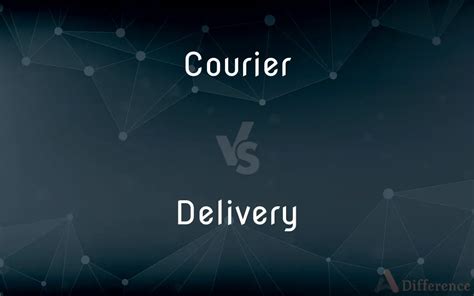The world of logistics and transportation has witnessed a significant evolution, with courier services and delivery systems playing pivotal roles in modern supply chains. As the demand for efficient and timely deliveries continues to rise, understanding the nuances between couriers and delivery services becomes crucial for businesses and consumers alike. This comprehensive article delves into the distinctions, advantages, and implications of each, offering an in-depth analysis backed by real-world examples and industry insights.
Courier Services: The Modern Messenger
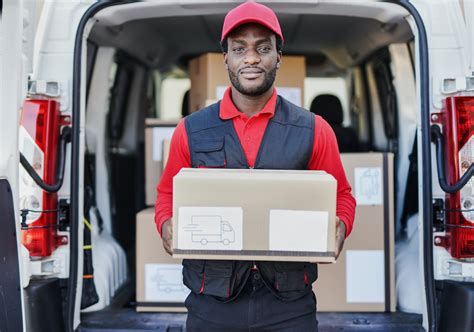
Courier services have been an integral part of the shipping industry for decades, but their role has evolved significantly with technological advancements and changing consumer expectations. Today, couriers are not just messengers but trusted partners in the complex web of logistics, offering specialized services and tailored solutions to meet diverse business needs.
Specialized Services
Couriers often specialize in specific types of shipments, catering to unique requirements. For instance, medical couriers handle sensitive biological samples, ensuring proper storage and transport conditions. They are equipped with specialized vehicles and trained personnel to handle time-critical and temperature-controlled deliveries. This level of specialization ensures the safe and efficient movement of critical healthcare items, such as blood samples, vaccines, and medical equipment.
Similarly, express couriers focus on speed and urgency. They employ advanced tracking systems and optimized routing to guarantee the fastest possible delivery times. This is especially crucial for time-sensitive documents, legal papers, and last-minute business requirements. Express couriers often provide real-time visibility, allowing senders to track the progress of their shipment and receive immediate notifications upon delivery.
Reliability and Tracking
Couriers are known for their reliability and meticulous tracking systems. Each shipment is assigned a unique tracking number, allowing senders and recipients to monitor its progress through various stages. This level of transparency and accountability is vital for businesses that require precise delivery times and for consumers who expect accurate and timely updates.
Furthermore, couriers often offer proof of delivery, providing documentation or digital signatures that confirm the recipient's receipt of the shipment. This feature is invaluable for legal and contractual purposes, ensuring that businesses have a clear audit trail and can resolve any potential disputes.
Customer Service and Flexibility
Courier services excel in customer service, offering personalized attention and flexibility. They often work closely with businesses to understand their unique needs and provide tailored solutions. This could involve scheduling deliveries at specific times, providing additional insurance coverage for high-value items, or offering specialized packaging solutions.
Additionally, couriers are adaptable to last-minute changes. If a business needs to modify a shipment's details or redirect a package, couriers can often accommodate these requests, ensuring a seamless and responsive delivery experience.
| Courier Advantage | Description |
|---|---|
| Specialized Services | Couriers offer specialized solutions for unique shipment requirements, such as medical or express deliveries. |
| Reliability and Tracking | Couriers provide meticulous tracking and proof of delivery, ensuring transparency and accountability. |
| Customer Service and Flexibility | Couriers offer personalized attention, adapting to last-minute changes and tailoring services to meet specific business needs. |
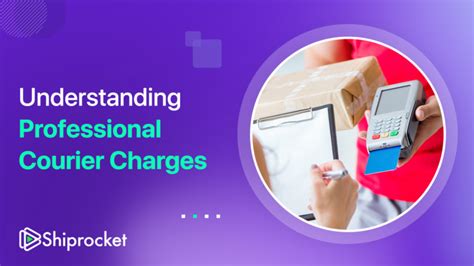
Delivery Services: A Broader Network
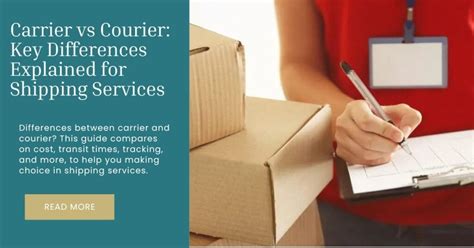
While courier services focus on specific and often more complex shipments, delivery services operate on a broader scale, catering to a wider range of delivery needs. They are the backbone of e-commerce, providing efficient and cost-effective solutions for businesses and consumers alike.
E-commerce Integration
Delivery services are deeply integrated into the e-commerce ecosystem. They often work seamlessly with online platforms and marketplaces, offering real-time shipping rate calculations, order management tools, and automated shipping label generation. This integration simplifies the shipping process for businesses, allowing them to focus on their core operations while leaving the logistics to the experts.
For instance, shipping plugins for e-commerce platforms like Shopify or WooCommerce often interface directly with delivery services, providing real-time rate comparisons and automated order fulfillment. This not only saves time but also ensures accuracy, reducing the chances of shipping errors and improving the overall customer experience.
Cost-Effectiveness
Delivery services are renowned for their cost-effectiveness, especially for bulk shipments and regular deliveries. They leverage economies of scale, utilizing large networks and optimized routes to offer competitive pricing. This is particularly advantageous for small and medium-sized businesses that may not have the negotiating power or shipping volume to secure favorable rates with couriers.
Furthermore, delivery services often provide discounted rates for frequent shipments or high-volume orders. This incentivizes businesses to consolidate their shipping needs with a single provider, leading to further cost savings and streamlined logistics.
Convenience and Accessibility
Delivery services are designed with convenience in mind. They offer flexible delivery options, such as drop-off at a convenient location or delivery to a nearby pickup point, reducing the need for customers to be present at a specific address during a narrow time window. This is especially beneficial for residential deliveries, where recipients may not always be available during standard business hours.
Additionally, delivery services often provide package tracking, allowing customers to monitor the progress of their orders. This tracking information is often more detailed, providing estimated delivery times and real-time updates on the shipment's location. Some delivery services even offer delivery notifications, sending a text or email alert when the package is out for delivery or has been delivered.
| Delivery Service Advantage | Description |
|---|---|
| E-commerce Integration | Delivery services seamlessly integrate with e-commerce platforms, offering real-time shipping rate calculations and automated order fulfillment. |
| Cost-Effectiveness | Leveraging economies of scale, delivery services offer competitive pricing, especially for bulk shipments and high-volume orders. |
| Convenience and Accessibility | Delivery services provide flexible delivery options and package tracking, ensuring convenience for both businesses and consumers. |
Comparative Analysis: Choosing the Right Service
The decision between a courier and a delivery service depends on the specific needs of the business or individual. While couriers offer specialized services and a higher level of customization, they may come at a premium cost. On the other hand, delivery services provide cost-effective solutions for standard shipments and offer convenience and accessibility for e-commerce businesses and consumers.
When to Choose a Courier
Couriers are ideal for businesses that require specialized services, such as medical or express deliveries. They are also well-suited for high-value shipments that demand additional insurance and security measures. Furthermore, couriers are the preferred choice when precision and real-time tracking are essential, ensuring that businesses can meet strict delivery deadlines and have complete visibility over their shipments.
When to Opt for a Delivery Service
Delivery services are an excellent choice for businesses that prioritize cost-effectiveness, especially for bulk shipments or high-volume orders. They are also the go-to option for e-commerce businesses that require seamless integration with online platforms and automated order fulfillment. Additionally, delivery services are preferred for residential deliveries, offering flexible delivery options and real-time tracking to enhance the customer experience.
| Scenario | Recommended Service |
|---|---|
| Specialized Shipments (Medical, Express) | Courier |
| High-Value Shipments | Courier |
| Precision and Real-Time Tracking | Courier |
| Cost-Effective Bulk Shipments | Delivery Service |
| E-commerce Integration and Automated Fulfillment | Delivery Service |
| Residential Deliveries | Delivery Service |
Future Implications and Industry Trends
The logistics industry is undergoing rapid transformation, driven by technological advancements and changing consumer behaviors. As e-commerce continues to grow, delivery services will play an increasingly critical role, focusing on last-mile delivery innovations and sustainable practices.
Last-Mile Delivery Innovations
The “last mile” of delivery, which refers to the final stage of transporting a shipment from a transportation hub to its final destination, is a key area of focus for delivery services. Innovations in this area include the use of drones for rapid and efficient deliveries, especially in remote or hard-to-reach areas. Electric delivery vehicles are also gaining traction, reducing environmental impact and offering cost savings through lower fuel and maintenance costs.
Furthermore, crowdsourced delivery is becoming a popular alternative, leveraging the gig economy to engage a network of independent contractors for on-demand deliveries. This model offers flexibility and scalability, allowing delivery services to quickly adapt to changing demand patterns.
Sustainability and Environmental Impact
With growing concerns about environmental sustainability, the logistics industry is under pressure to reduce its carbon footprint. Delivery services are embracing sustainable practices, such as optimizing routes to minimize fuel consumption and adopting electric or hybrid vehicles. They are also exploring packaging innovations, such as recyclable materials and reduced packaging, to minimize waste.
Additionally, delivery services are partnering with businesses to offer sustainable shipping options, allowing customers to choose eco-friendly delivery methods. This not only reduces the environmental impact but also enhances brand reputation and customer loyalty.
The Rise of Same-Day and Instant Delivery
Consumer expectations for faster delivery are on the rise, driving the demand for same-day and instant delivery services. Delivery services are investing in technology and infrastructure to meet these demands, offering ultra-fast delivery options that can get packages to customers within hours of ordering. This trend is particularly evident in urban areas, where the proximity of customers and businesses allows for efficient and rapid deliveries.
The integration of delivery lockers and pickup points is also gaining traction, providing convenient options for customers to receive their orders without the need for home delivery. This not only reduces the burden on delivery networks but also offers flexibility and control to customers.
Frequently Asked Questions
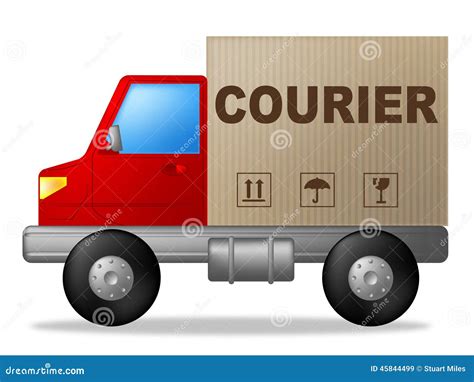
What are the key differences between courier and delivery services?
+Courier services specialize in specific and often more complex shipments, offering tailored solutions for unique requirements. They provide meticulous tracking and often cater to high-value or time-sensitive deliveries. Delivery services, on the other hand, focus on cost-effectiveness and convenience, catering to a broader range of shipping needs. They are deeply integrated into the e-commerce ecosystem, offering seamless order fulfillment and flexible delivery options.
When should I choose a courier service over a delivery service?
+Couriers are ideal for specialized shipments, such as medical or express deliveries, and for high-value items that require additional insurance and security measures. They are also preferred when precision and real-time tracking are crucial. Courier services offer a higher level of customization and can accommodate last-minute changes.
What are the advantages of using a delivery service for e-commerce businesses?
+Delivery services are seamlessly integrated with e-commerce platforms, offering real-time shipping rate calculations and automated order fulfillment. They provide cost-effective solutions for bulk shipments and high-volume orders. Additionally, delivery services offer flexible delivery options and package tracking, enhancing the customer experience.
How are delivery services addressing sustainability concerns?
+Delivery services are embracing sustainable practices, such as optimizing routes to reduce fuel consumption, adopting electric or hybrid vehicles, and exploring packaging innovations to minimize waste. They are also offering sustainable shipping options to customers, allowing them to choose eco-friendly delivery methods.
What innovations are shaping the future of delivery services?
+The future of delivery services is focused on last-mile delivery innovations, such as drone deliveries, electric vehicles, and crowdsourced delivery. They are also investing in ultra-fast delivery options and integrating delivery lockers and pickup points to meet growing consumer expectations for faster and more convenient deliveries.
